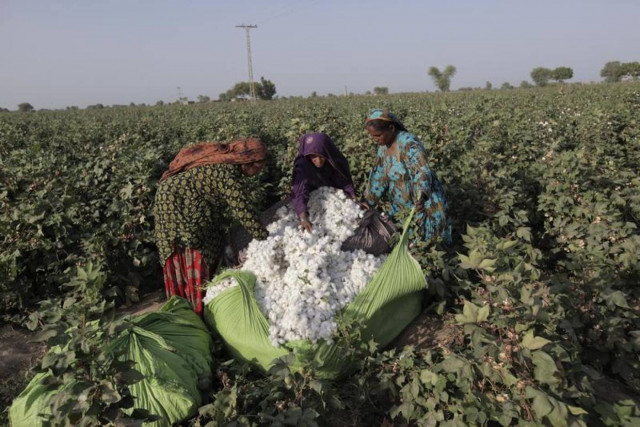Climate damage to Pakistan's cotton crop ripples through economy
This fiscal year, cotton farmers will fall drastically short of government's target of 15 million bales

This fiscal year, cotton farmers will fall drastically short of government's target of 15 million bales. PHOTO: REUTERS
Then unusually heavy rains pelted Khanewal district in eastern Pakistan's Punjab province, destroying the cotton plants just as they were fruiting.
"All my dreams and plans were shattered," said Ahmad. "I am so disappointed with this year's loss that I may quit cotton cultivation from next year."
Another season of erratic weather has crippled Pakistan's already ailing cotton sector, resulting in lost revenue and jobs that could cost the economy more than $3 billion by the end of the fiscal year in June 2020, industry experts have warned.
Heavy rains and high temperatures during the whole of the cotton-growing season from April to September severely damaged the crop, said Khalid Abdullah, cotton commissioner and vice president of the Pakistan Central Cotton Committee.
That has put a strain on the entire textile industry, he told the Thomson Reuters Foundation.
Most of Pakistan's cotton is grown in the southern part of Punjab province which experienced unexpectedly high temperatures in August and September, even at night, Abdullah explained.
The rest is mainly cultivated in Sindh province in the southeast.
Together, the heavy rains and dry spells destroyed over a third of the country's expected cotton harvest, according to the state-run Central Cotton Research Institute (CCRI) in Multan, southern Punjab.
Yet again, Pakistan's cotton farmers have seen their cash crop devastated by unpredictable climate extremes, said Abdullah.
"The farmers are continuously hit by changing weather conditions," he said.
Last year the culprit was unusual heat which parched crops and dried up rivers in the two regions.
Cotton is a major driver of the economy, contributing almost 1% of GDP, according to the Pakistan Bureau of Statistics.
But this fiscal year, cotton farmers will fall drastically short of the government's target of 15 million bales.
To meet the demands of its textile industry, Pakistan regularly imports cotton - mainly from Turkmenistan, Uzbekistan and the United States, according to the CCRI.
By June, the country will have to bring in at least 6 million bales - almost double what it imported last financial year, said Shahid Sattar, executive director of the All Pakistan Textile Mills Association (APTMA).
Importing cotton is expensive, which pushes up the overall cost of textile production, he explained.
Figures from the All Pakistan Textile Mills Association (Aptma) show that cotton, the main raw material for the textile industry, accounts for about 70% of the basic cost of the final garment.
"Failure of the cotton crop translates into damage to the country's economy," Sattar said.
Better forecasts
To help farmers cope with the increasingly extreme weather, Abdullah said the Pakistan Central Cotton Committee has directed its national seed-breeding program to come up with new climate-resilient varieties to hand out to farmers.
Another major problem is that most rural growers lack access to weather forecasts from the meteorological department, he added.
And that information is only delivered in five languages, including English and Urdu, which is a problem for many farmers in a country where more than 70 languages are spoken.
In a bid to tackle the issue, in 2016 the cotton committee launched TeleCotton, a text message service that delivers simple, clear weather information and advice to farmers in their local language, Abdullah said.
So far, only about 25,000 farmers have signed up, but the committee is working on registering more users and increasing the frequency of the messages, he added.
Ahmad, the farmer in Khanewal, said the government needed to do more to make it possible for him to keep growing cotton - otherwise, he might have to abandon the crop for rice.
He told the Thomson Reuters Foundation he would like to see the government set up testing stations in every village.
If farmers can check the quality of their seeds and pesticides before using them, that would go a long way to improving cotton production, he said.
"Cotton is not only our lifeline but the lifeline of the country's economy too," he said. "It needs the policymakers' attention."



















COMMENTS
Comments are moderated and generally will be posted if they are on-topic and not abusive.
For more information, please see our Comments FAQ